Cap LoRa868 Arduino 使用教程
1. 准备工作
- 环境配置: 参考 Arduino IDE 上手教程完成 IDE 安装,并根据实际使用的开发板安装对应的板管理,与需要的驱动库。
- 使用到的驱动库:
注意
TinyGPSPlus 库需要在 GitHub 上下载适配过 M5Stack 设备的库版本,库地址: TinyGPSPlus - M5Stack GitHub,请勿在 Arduino Library 中下载。(如有疑问,请参考此教程)
- 使用到的硬件产品:

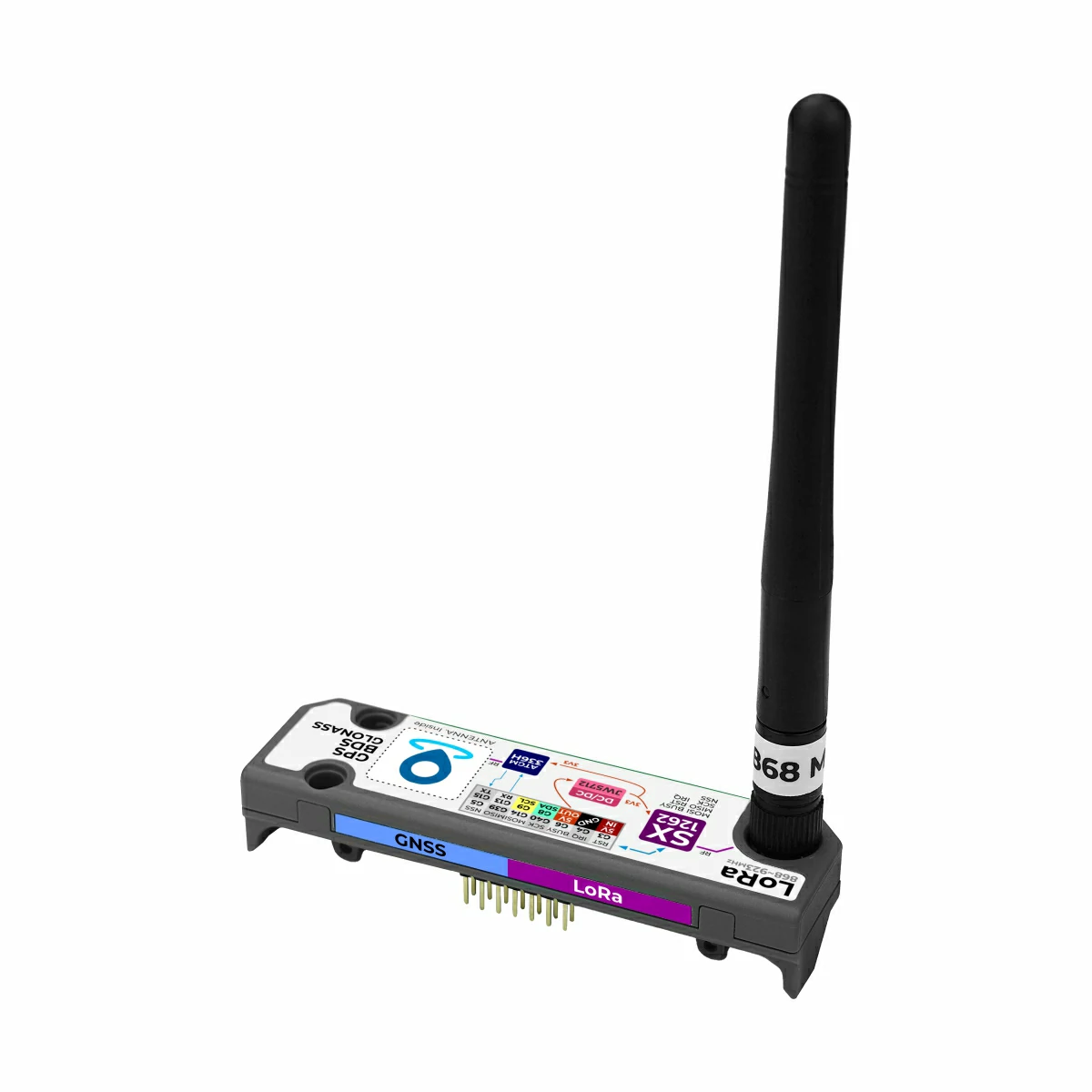
2. 编译上传
- 将 Cardputer-Adv 侧面的开关键置于
OFF状态,然后在开机前按住G0按键,在设备后通电后释放,之后设备将进入下载模式,等待烧录。
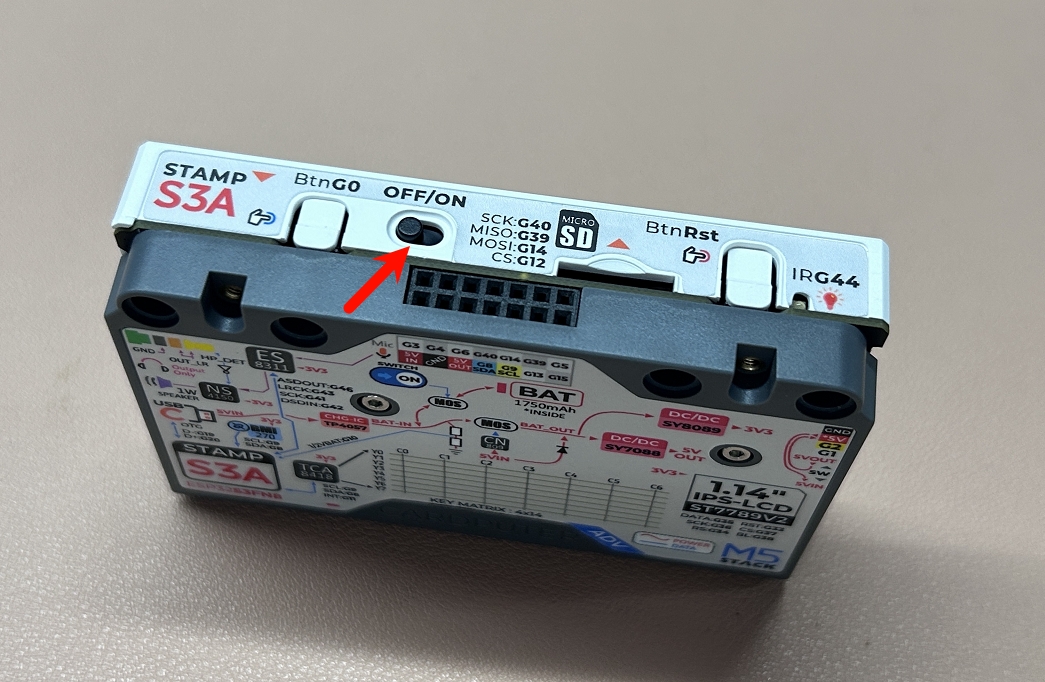
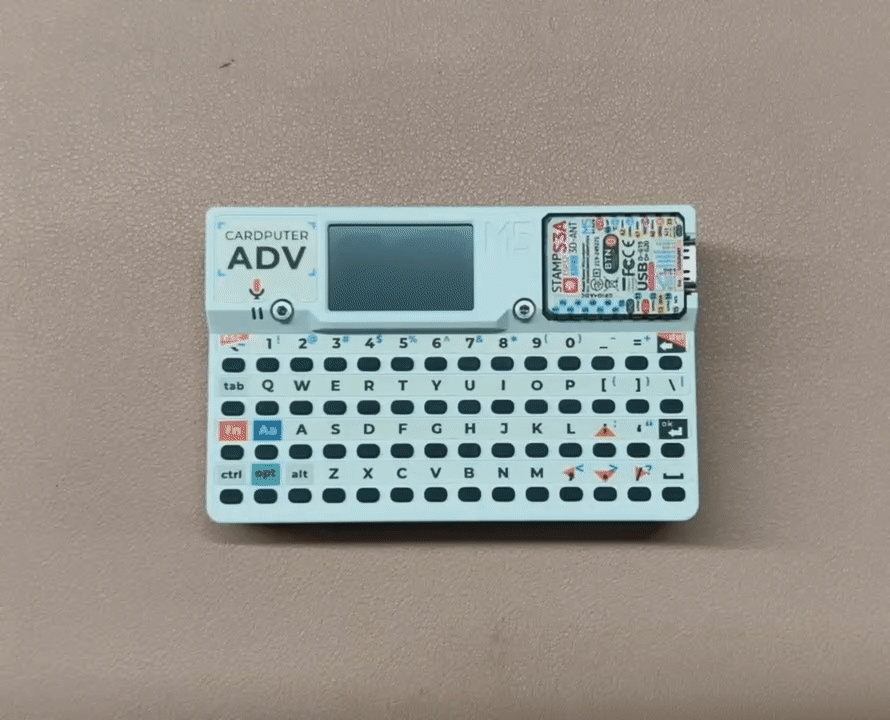
- 选中设备端口,点击 Arduino IDE 左上角编译上传按钮,等待程序完成编译并上传至设备。
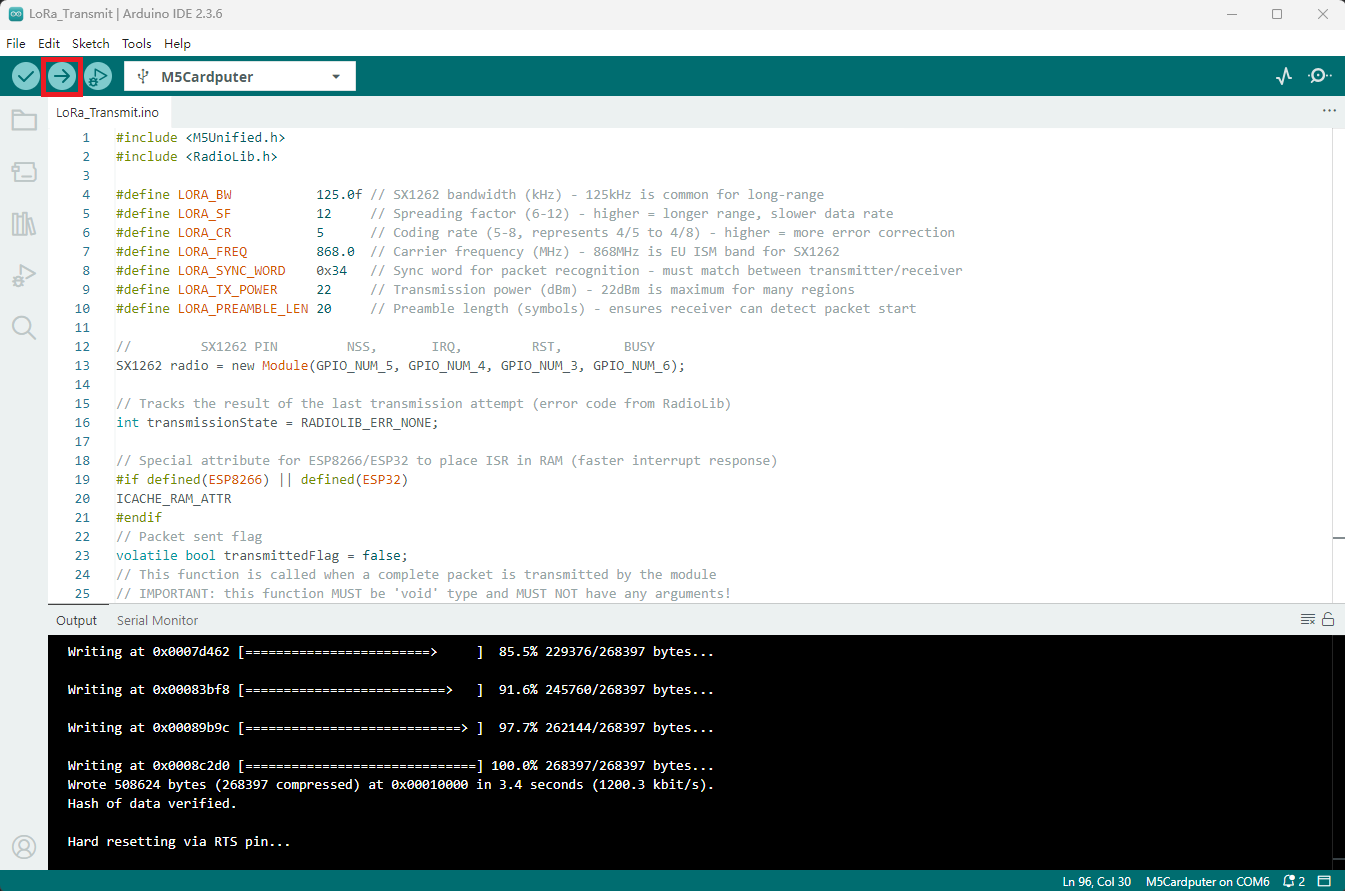
3. 案例程序
- 本教程中使用的主控设备为 Cardputer-Adv ,搭配 Cap LoRa868。 Cap LoRa868 的 LoRa 部分采用 SPI 的方式通讯, GPS 部分采用串口的方式通讯,请根据实际的电路连接修改程序中的引脚定义,设备连接后对应的 SPI IO 为
G5 (NSS)、G4 (TRQ)、G3 (RST)、G6 (BUSY),串口 IO 为G15 (RX)、G13 (TX)。
实物连接组装如下图所示:

3.1 LoRa 使用案例
发送端
cpp
1 2 3 4 5 6 7 8 9 10 11 12 13 14 15 16 17 18 19 20 21 22 23 24 25 26 27 28 29 30 31 32 33 34 35 36 37 38 39 40 41 42 43 44 45 46 47 48 49 50 51 52 53 54 55 56 57 58 59 60 61 62 63 64 65 66 67 68 69 70 71 72 73 74 75 76 77 78 79 80 81 82 83 84 85 86 87 88 89 90 91 92 93 94 95 96 97 98 99 100 101 102 103 104 105 106 107 108 109
#include <M5Unified.h>
#include <RadioLib.h>
#define LORA_BW 125.0f // SX1262 bandwidth (kHz) - 125kHz is common for long-range
#define LORA_SF 12 // Spreading factor (6-12) - higher = longer range, slower data rate
#define LORA_CR 5 // Coding rate (5-8, represents 4/5 to 4/8) - higher = more error correction
#define LORA_FREQ 868.0 // Carrier frequency (MHz) - 868MHz is EU ISM band for SX1262
#define LORA_SYNC_WORD 0x34 // Sync word for packet recognition - must match between transmitter/receiver
#define LORA_TX_POWER 22 // Transmission power (dBm) - 22dBm is maximum for many regions
#define LORA_PREAMBLE_LEN 20 // Preamble length (symbols) - ensures receiver can detect packet start
// SX1262 PIN NSS, IRQ, RST, BUSY
SX1262 radio = new Module(GPIO_NUM_5, GPIO_NUM_4, GPIO_NUM_3, GPIO_NUM_6);
// Tracks the result of the last transmission attempt (error code from RadioLib)
int transmissionState = RADIOLIB_ERR_NONE;
// Special attribute for ESP8266/ESP32 to place ISR in RAM (faster interrupt response)
#if defined(ESP8266) || defined(ESP32)
ICACHE_RAM_ATTR
#endif
// Packet sent flag
volatile bool transmittedFlag = false;
// This function is called when a complete packet is transmitted by the module
// IMPORTANT: this function MUST be 'void' type and MUST NOT have any arguments!
void setFlag(void)
{
// we sent a packet, set the flag
transmittedFlag = true;
}
void setup()
{
M5.begin();
Serial.begin(115200);
M5.Display.setFont(&fonts::FreeMonoBold9pt7b);
// Init SX1262
Serial.print(F("[LoRa] Initializing ... "));
int state =
radio.begin(LORA_FREQ, LORA_BW, LORA_SF, LORA_CR, LORA_SYNC_WORD, LORA_TX_POWER, LORA_PREAMBLE_LEN, 3.0, true);
if (state == RADIOLIB_ERR_NONE) {
Serial.println(F("Init success!"));
} else {
Serial.print(F("Init failed, code: "));
Serial.println(state);
while (true) { delay(10); }
}
radio.setCurrentLimit(140); radio.setCurrentLimit(140);// Current range: 0-140mA , step 2.5mA
// Register callback function after sending packet successfully
radio.setPacketSentAction(setFlag);
// Send first packet to enable flag
Serial.print(F("[LoRa] Sending first packet... "));
transmissionState = radio.startTransmit("Hello World!");
M5.Display.setCursor(5,0);
M5.Display.printf("Hello World!\n");
}
// Counter to keep track of transmitted packets
int count = 0;
void loop()
{
if (transmittedFlag) {
// reset flag
transmittedFlag = false;
if (transmissionState == RADIOLIB_ERR_NONE) {
// packet was successfully sent
Serial.println(F("Transmission finished!"));
M5.Display.println("Send sucessfully!");
// NOTE: when using interrupt-driven transmit method,
// it is not possible to automatically measure
// transmission data rate using getDataRate()
} else {
Serial.print(F("Send failed, code: "));
Serial.println(transmissionState);
M5.Display.print("\nSend failed\ncode:");
M5.Display.println(transmissionState);
}
// Clean up after transmission is finished
// This will ensure transmitter is disabled,
// RF switch is powered down etc.
radio.finishTransmit();
// Wait a second before transmitting again
delay(1000);
Serial.printf("[LoRa] Sending #%d packet ... ", count);
// You can transmit C-string or Arduino string up to 256 characters long
String str = "Cap LoRa868#" + String(count++);
transmissionState = radio.startTransmit(str);
M5.Display.clear();
M5.Display.setCursor(0,5);
M5.Display.printf("[LoRa]\nSending #%d packet\n......\n", count);
// You can also transmit byte array up to 256 bytes long
/*
byte byteArr[] = {0x01, 0x23, 0x45, 0x67,
0x89, 0xAB, 0xCD, 0xEF};
transmissionState = radio.startTransmit(byteArr, 8);
*/
}
}接收端
cpp
1 2 3 4 5 6 7 8 9 10 11 12 13 14 15 16 17 18 19 20 21 22 23 24 25 26 27 28 29 30 31 32 33 34 35 36 37 38 39 40 41 42 43 44 45 46 47 48 49 50 51 52 53 54 55 56 57 58 59 60 61 62 63 64 65 66 67 68 69 70 71 72 73 74 75 76 77 78 79 80 81 82 83 84 85 86 87 88 89 90 91 92 93 94 95 96 97 98 99 100 101 102 103 104 105 106 107 108 109 110 111 112 113 114 115 116 117 118 119 120 121 122 123
#include <M5Unified.h>
#include <RadioLib.h>
#define LORA_BW 125.0f // LoRa bandwidth (kHz) - 125kHz is common for long-range
#define LORA_SF 12 // Spreading factor (6-12) - higher = longer range, slower data rate
#define LORA_CR 5 // Coding rate (5-8, represents 4/5 to 4/8) - higher = more error correction
#define LORA_FREQ 868.0 // Carrier frequency (MHz) - 868MHz is EU ISM band for LoRa
#define LORA_SYNC_WORD 0x34 // Sync word for packet recognition - must match between transmitter/receiver
#define LORA_TX_POWER 22 // Transmission power (dBm) - 22dBm is maximum for many regions
#define LORA_PREAMBLE_LEN 20 // Preamble length (symbols) - ensures receiver can detect packet start
// SX1262 PIN NSS, IRQ, RST, BUSY
SX1262 radio = new Module(GPIO_NUM_5, GPIO_NUM_4, GPIO_NUM_3, GPIO_NUM_6);
#if defined(ESP8266) || defined(ESP32)
ICACHE_RAM_ATTR
#endif
// Packet received flag
volatile bool receivedFlag = false;
// This function is called when a complete packet is received by the module
// IMPORTANT: This function MUST be 'void' type and MUST NOT have any arguments!
void setFlag(void)
{
receivedFlag = true;
}
void setup()
{
M5.begin();
Serial.begin(115200);
M5.Display.setFont(&fonts::FreeMonoBold9pt7b);
// Init SX1262
Serial.print(F("[LoRa] Initializing ... "));
int state = radio.begin(LORA_FREQ, LORA_BW, LORA_SF, LORA_CR, LORA_SYNC_WORD, LORA_TX_POWER, LORA_PREAMBLE_LEN, 3.0, true);
if (state == RADIOLIB_ERR_NONE) {
Serial.println(F("Init success!"));
} else {
Serial.print(F("Init failed, code: "));
Serial.println(state);
while (true) { delay(10); }
}
radio.setCurrentLimit(140);// Current range: 0-140mA , step 2.5mA
// Register callback function after receiving packet successfully
radio.setPacketReceivedAction(setFlag);
// Start listening for LoRa packets
Serial.print(F("[LoRa] Starting to listen ... "));
state = radio.startReceive();
if (state == RADIOLIB_ERR_NONE) {
Serial.println(F("Listen successfully!"));
} else {
Serial.print(F("Listen failed, code: "));
Serial.println(state);
while (true) { delay(10); }
}
// If needed, 'listen' mode can be disabled by calling any of the following methods:
// radio.standby()
// radio.sleep()
// radio.transmit();
// radio.receive();
// radio.scanChannel();
}
void loop()
{
if (receivedFlag) {
// reset flag
receivedFlag = false;
// Read received data as an Arduino String
String str;
int state = radio.readData(str);
// Read received data as byte array
/*
byte byteArr[8];
int numBytes = radio.getPacketLength();
int state = radio.readData(byteArr, numBytes);
*/
if (state == RADIOLIB_ERR_NONE) {
// Packet was successfully received
Serial.println(F("[LoRa] Received packet:"));
M5.Display.clear();
M5.Display.setCursor(0,5);
M5.Display.printf("[LoRa]\nReceived packet:\n");
// Data of the packet
Serial.print(F("[LoRa] Data:\t\t"));
Serial.println(str);
M5.Display.printf("Data: %s\n", str.c_str());
// RSSI (Received Signal Strength Indicator)
Serial.print(F("[LoRa] RSSI:\t\t"));
Serial.print(radio.getRSSI());
Serial.println(F(" dBm"));
M5.Display.printf("RSSI: %0.2f dBm\n", radio.getRSSI());
// SNR (Signal-to-Noise Ratio)
Serial.print(F("[LoRa] SNR:\t\t"));
Serial.print(radio.getSNR());
Serial.println(F(" dB"));
M5.Display.printf("SNR: %0.2f dB\n", radio.getSNR());
// Frequency error
Serial.print(F("[LoRa] Frequency error:\t"));
Serial.print(radio.getFrequencyError());
Serial.println(F(" Hz"));
M5.Display.printf("Freq err: %0.2f Hz\n", radio.getFrequencyError());
} else if (state == RADIOLIB_ERR_CRC_MISMATCH) {
// Packet was received, but is malformed
Serial.println(F("CRC error!"));
} else {
Serial.print(F("Receive failed, code: "));
Serial.println(state);
}
}
}上述例程效果为发送端会每秒发送一次包含计数的字符串,接收端会打印接收到的字符串,并显示 RSSI、SNR 和频率误差等信息。
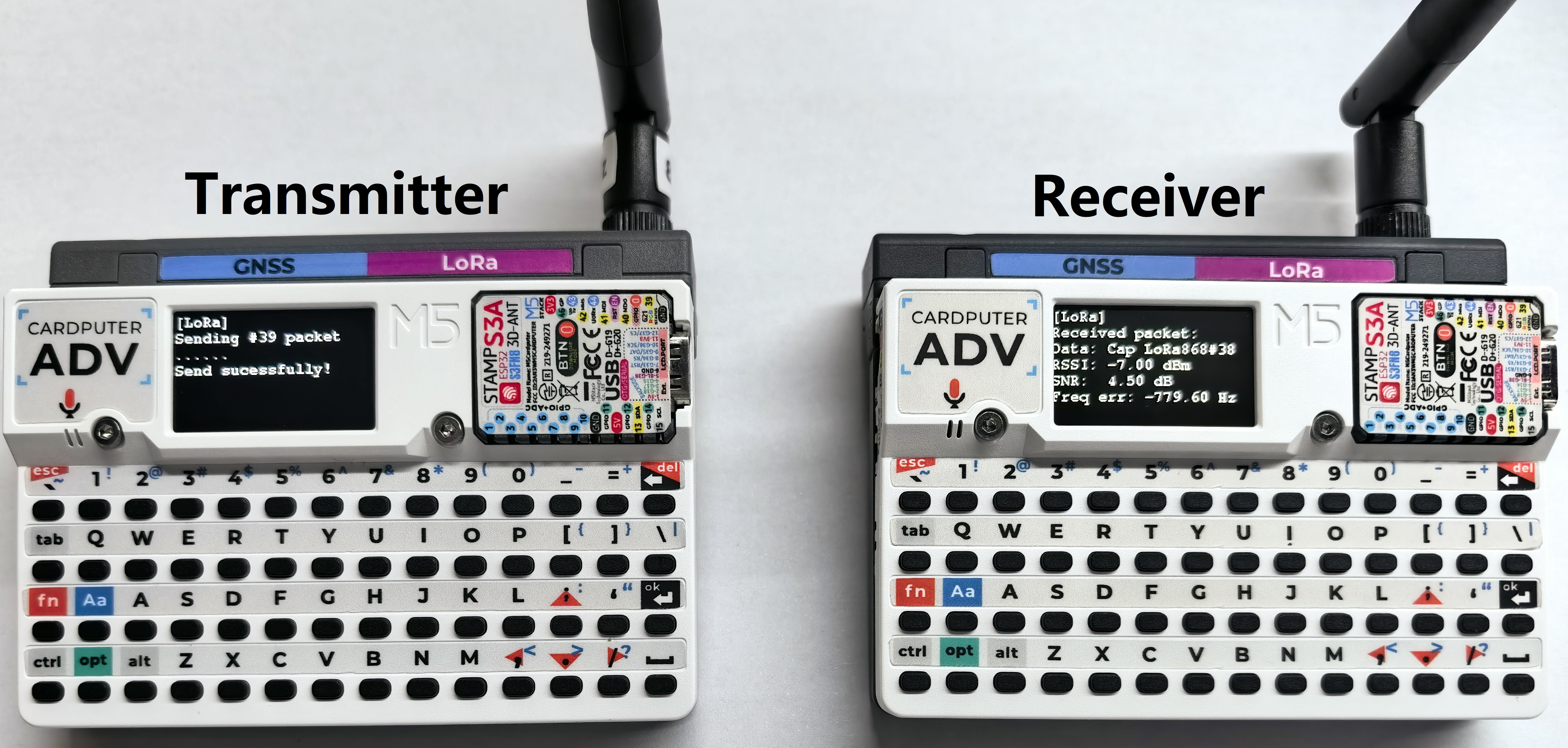
- 发送端串口返回信息:
[LoRa] Sending #39 packet ... Transmission finished!- 接收端串口返回信息:
[LoRa] Received packet:
[LoRa] Data: Cap LoRa868#38
[LoRa] RSSI: -7.00 dBm
[LoRa] SNR: 4.50 dB
[LoRa] Frequency error: -779.60 Hz3.2 GPS 使用案例
- 本设备 GPS 模块支持多种卫星系统,包括 GPS、GLONASS、GALILEO、BDS 和 QZSS,例程提供了修改卫星系统的函数
setSatelliteMode(),默认为 GLONASS 系统,当修改后屏幕上的前缀也会随之修改,方便确定卫星系统。
cpp
1 2 3 4 5 6 7 8 9 10 11 12 13 14 15 16 17 18 19 20 21 22 23 24 25 26 27 28 29 30 31 32 33 34 35 36 37 38 39 40 41 42 43 44 45 46 47 48 49 50 51 52 53 54 55 56 57 58 59 60 61 62 63 64 65 66 67 68 69 70 71 72 73 74 75 76 77 78 79 80 81 82 83 84 85 86 87 88 89 90 91 92 93 94 95 96 97 98 99 100 101 102 103 104 105 106 107 108 109 110 111 112 113 114 115 116 117 118 119 120 121 122 123 124 125 126 127 128 129 130
#include "M5Unified.h"
#include "M5GFX.h"
#include "MultipleSatellite.h"
static const int RXPin = 15, TXPin = 13;
static const uint32_t GPSBaud = 115200;
MultipleSatellite gps(Serial1, GPSBaud, SERIAL_8N1, RXPin, TXPin);
// Variable to track current satellite system mode (default: GLONASS)
satellite_mode_t currentMode = SATELLITE_MODE_GLONASS;
// Function prototype for displaying information
void displayInfo(void);
/**
* Get the prefix string for different satellite systems
* @param mode Current satellite system mode
* @return Corresponding prefix string for the satellite system
*/
const char* getSatPrefix(satellite_mode_t mode) {
switch (mode) {
case SATELLITE_MODE_GPS: return "GPS_Sat"; // GPS satellite prefix
case SATELLITE_MODE_BDS: return "BDS_Sat"; // BeiDou satellite prefix
case SATELLITE_MODE_GLONASS: return "GLN_Sat"; // GLONASS satellite prefix
case SATELLITE_MODE_GALILEO: return "GAL_Sat"; // Galileo satellite prefix
case SATELLITE_MODE_QZSS: return "QZS_Sat"; // QZSS satellite prefix
default: return "Unknown"; // Default for unknown systems
}
}
void setup() {
M5.begin();
Serial.begin(115200);
M5.Display.setFont(&fonts::FreeMonoBold9pt7b);
gps.begin(); // Initialize GPS module
// Set GPS to factory start mode
gps.setSystemBootMode(BOOT_FACTORY_START);
// Print initialization information to serial monitor
Serial.println(F("<----------Cap LoRa868 Example---------->"));
Serial.print(F("Testing TinyGPSPlus library v. "));
Serial.println(TinyGPSPlus::libraryVersion());
String version = gps.getGNSSVersion();
Serial.printf("GNSS SW=%s\r\n", version.c_str());
delay(1000); // Short delay for initialization
displayInfo(); // Initial display of information
}
void loop() {
gps.updateGPS(); // Update GPS data
displayInfo(); // Update display with new data
delay(100);
}
void displayInfo(void) {
Serial.println("=========================================");
Serial.print(F("Location: "));
Serial.printf("satellites:%d\n", gps.satellites.value());
String gps_mode = gps.getSatelliteMode();
Serial.printf("GNSS Mode:%s\r\n", gps_mode.c_str());
// Get appropriate satellite prefix based on current mode
const char* satPrefix = getSatPrefix(currentMode);
// Check if location data has been updated
if (gps.location.isUpdated()) {
auto latitude = gps.location.lat();
auto longitude = gps.location.lng();
// Print latitude and longitude to serial with 6 decimal places
Serial.print(latitude, 6); Serial.print(F(","));
Serial.print(longitude, 6);Serial.print(F("\n"));
M5.Display.fillRect(0, 0, 240, 135, TFT_BLACK);
M5.Display.setCursor(0, 0);
M5.Display.printf("%s: \nSat: %d\nLat: %.6f\nlng: %.6f\n", satPrefix,
(uint8_t)gps.satellites.value(),
latitude,
longitude);
} else {
// If no valid location data, display placeholders
M5.Display.fillRect(0, 0, 240, 135, TFT_BLACK);
M5.Display.setCursor(0, 0);
M5.Display.printf("%s\n", satPrefix);
M5.Display.print("Sat: ----\nLat: ----\nLng: ----\n");
Serial.print(F("LOCATION INVALID\n")); // Indicate invalid data on serial
}
Serial.print(F("Date/Time: "));
// Check if date data has been updated
if (gps.date.isUpdated()) {
auto month = gps.date.month();
auto day = gps.date.day();
auto year = gps.date.year();
// Print date to serial (month/day/year)
Serial.printf("%d/%d/%d ", month, day, year);
M5.Display.fillRect(0, 80, 128, 128, TFT_BLACK);
M5.Display.setCursor(0, 80);
M5.Display.printf("Date: %d/%d/%d\n", month, day, year);
} else {
Serial.print(F("DATE INVALID")); // Indicate invalid date
}
// Check if time data has been updated
if (gps.time.isUpdated()) {
auto hour = gps.time.hour();
auto minute = gps.time.minute();
auto sec = gps.time.second();
auto centisec = gps.time.centisecond();
// Print time to serial with leading zeros where necessary (HH:MM:SS.CS)
if (hour < 10) Serial.print(F("0"));
Serial.print(hour);Serial.print(F(":"));
if (minute < 10) Serial.print(F("0"));
Serial.print(minute);Serial.print(F(":"));
if (sec < 10) Serial.print(F("0"));
Serial.print(sec);Serial.print(F("."));
if (centisec < 10) Serial.print(F("0"));
Serial.print(centisec);
M5.Display.fillRect(0, 128, 128, 60, TFT_BLACK);
M5.Display.setCursor(0, 96);
M5.Display.printf("Time: %02d:%02d:%02d.%02d\n", hour, minute, sec, centisec);
} else {
Serial.print(F("TIME INVALID")); // Indicate invalid time
}
Serial.println();
delay(1000); // Delay to stabilize display updates
} 由于该产品 GPS 采用内置天线,无外置天线,请尽量在户外空旷区域使用,如操场、天台等,且定位等待时间较长,约为几分钟,请耐心等待设备成功搜索卫星与获取坐标。
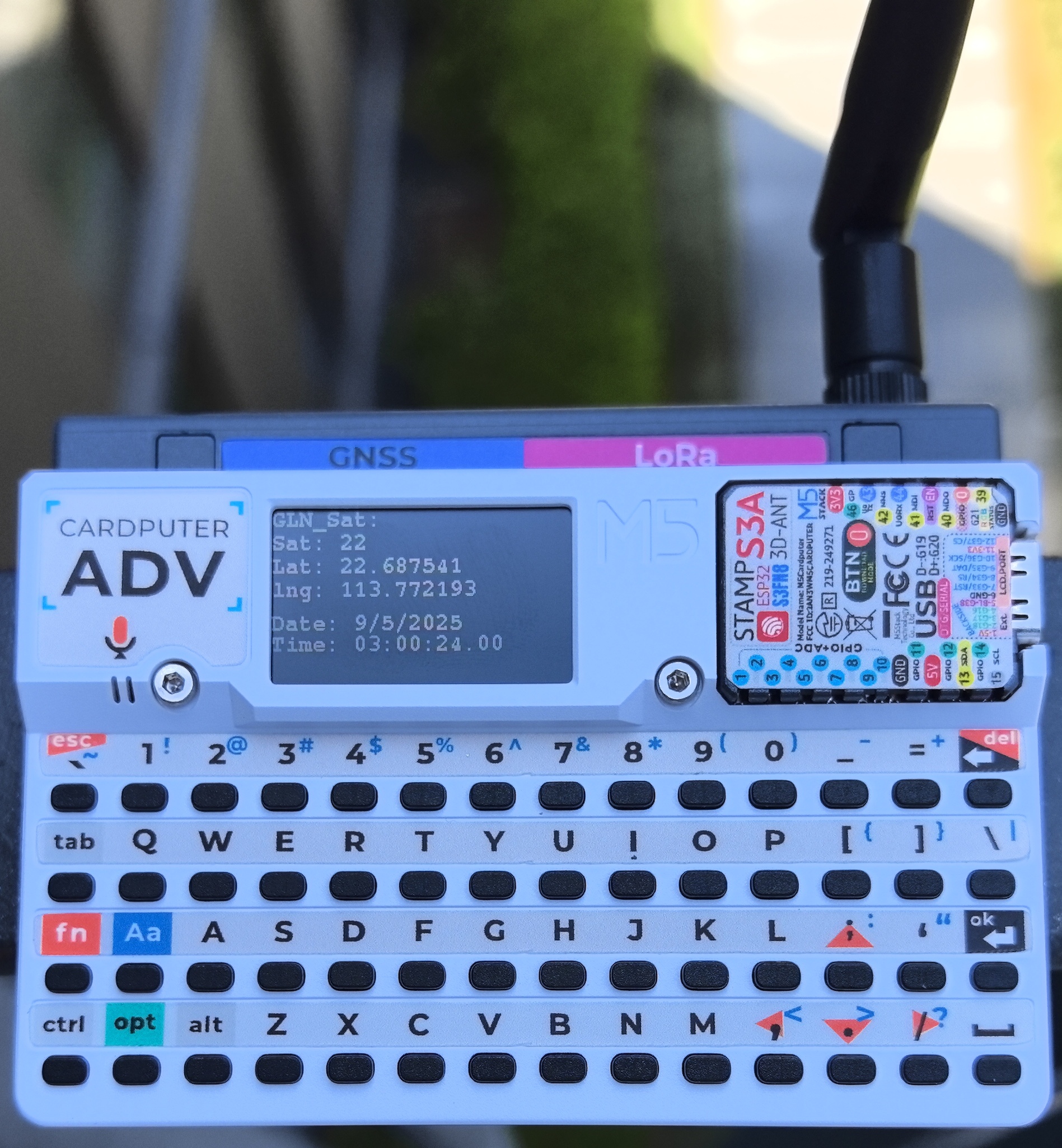
- 串口返回信息:
=========================================
Location: satellites:22
GNSS Mode:GLN_Sat
22.687541,113.772193
Date/Time: 9/5/2025 03:00:24.003.3 使用 LoRa 通信传递 GPS 信息
发送端
cpp
1 2 3 4 5 6 7 8 9 10 11 12 13 14 15 16 17 18 19 20 21 22 23 24 25 26 27 28 29 30 31 32 33 34 35 36 37 38 39 40 41 42 43 44 45 46 47 48 49 50 51 52 53 54 55 56 57 58 59 60 61 62 63 64 65 66 67 68 69 70 71 72 73 74 75 76 77 78 79 80 81 82 83 84 85 86 87 88 89 90 91 92 93 94 95 96 97 98 99 100 101 102 103 104 105 106 107 108 109 110 111 112 113 114 115 116 117 118 119 120 121 122 123 124 125 126 127 128 129 130 131 132 133 134 135 136 137 138 139 140 141 142 143 144 145 146 147 148 149 150 151 152 153 154 155 156 157 158 159 160 161 162 163 164 165 166 167 168 169 170 171 172 173 174 175 176 177 178 179 180 181 182 183 184 185 186 187 188 189 190 191
#include <M5Unified.h>
#include <RadioLib.h>
#include "M5GFX.h"
#include "MultipleSatellite.h"
// LoRa configuration parameters
#define LORA_BW 125.0f // Bandwidth (kHz)
#define LORA_SF 12 // Spreading factor (6-12)
#define LORA_CR 5 // Coding rate (5-8)
#define LORA_FREQ 868.0 // Frequency (MHz)
#define LORA_SYNC_WORD 0x34 // Sync word
#define LORA_TX_POWER 22 // Transmission power (dBm)
#define LORA_PREAMBLE_LEN 20 // Preamble length
// LoRa pin definition
SX1262 radio = new Module(GPIO_NUM_5, GPIO_NUM_4, GPIO_NUM_3, GPIO_NUM_6);
// GPS configuration parameters
static const int RXPin = 15, TXPin = 13;
static const uint32_t GPSBaud = 115200;
MultipleSatellite gps(Serial1, GPSBaud, SERIAL_8N1, RXPin, TXPin);
// Global variables
int transmissionState = RADIOLIB_ERR_NONE;
volatile bool transmittedFlag = false;
int count = 0;
satellite_mode_t currentMode = SATELLITE_MODE_GLONASS;
float lastLat = 0.0f, lastLng = 0.0f;
int lastSatellites = 0;
String lastDate = "", lastTime = "";
// LoRa transmission completion callback function
#if defined(ESP8266) || defined(ESP32)
ICACHE_RAM_ATTR
#endif
void setFlag(void) {
transmittedFlag = true;
}
// Function to get satellite system prefix
const char* getSatPrefix(satellite_mode_t mode) {
switch (mode) {
case SATELLITE_MODE_GPS: return "GPS_Sat";
case SATELLITE_MODE_BDS: return "BDS_Sat";
case SATELLITE_MODE_GLONASS: return "GLN_Sat";
case SATELLITE_MODE_GALILEO: return "GAL_Sat";
case SATELLITE_MODE_QZSS: return "QZS_Sat";
default: return "Unknown";
}
}
// Function to update display information
String displayInfo(void) {
M5.Display.setTextColor(TFT_WHITE);
Serial.println("\n=========================================");
Serial.print(F("Location: "));
// Update satellite count
lastSatellites = gps.satellites.value();
Serial.printf("satellites:%d\n", lastSatellites);
String gps_mode = gps.getSatelliteMode();
Serial.printf("GNSS Mode:%s\r\n", gps_mode.c_str());
const char* satPrefix = getSatPrefix(currentMode);
// Update location information
if (gps.location.isUpdated()) {
lastLat = gps.location.lat();
lastLng = gps.location.lng();
Serial.print(lastLat, 6); Serial.print(F(","));
Serial.print(lastLng, 6);Serial.print(F("\n"));
// Display GPS information
M5.Display.fillRect(0, 0, 240, 135, TFT_BLACK);
M5.Display.setCursor(0, 0);
M5.Display.printf("%s: \nSat: %d\nLat: %.6f\nLng: %.6f\n",
satPrefix, lastSatellites, lastLat, lastLng);
} else {
M5.Display.fillRect(0, 0, 240, 135, TFT_BLACK);
M5.Display.setCursor(0, 0);
M5.Display.printf("%s\nSat: ----\nLat: ----\nLng: ----\n", satPrefix);
Serial.print(F("LOCATION INVALID\n"));
}
// Update date information
Serial.print(F("Date/Time: "));
if (gps.date.isUpdated()) {
lastDate = String(gps.date.month()) + "/" +
String(gps.date.day()) + "/" +
String(gps.date.year());
Serial.print(lastDate);
Serial.print(F(" "));
M5.Display.setCursor(0, 75);
M5.Display.printf("Date: %s\n", lastDate.c_str());
} else {
lastDate = "DATE INVALID";
Serial.print(F("DATE INVALID "));
}
// Update time information
if (gps.time.isUpdated()) {
lastTime = (gps.time.hour() < 10 ? "0" : "") + String(gps.time.hour()) + ":" +
(gps.time.minute() < 10 ? "0" : "") + String(gps.time.minute()) + ":" +
(gps.time.second() < 10 ? "0" : "") + String(gps.time.second()) + "." +
(gps.time.centisecond() < 10 ? "0" : "") + String(gps.time.centisecond());
Serial.print(lastTime);
M5.Display.printf("Time: %s\n", lastTime.c_str());
} else {
lastTime = "TIME INVALID";
Serial.print(F("TIME INVALID"));
}
Serial.println();
return String("Type:") + satPrefix +
" Count:" + String(count) +
" Sat:" + String(lastSatellites) +
" Lat:" + String(lastLat, 6) +
" Lng:" + String(lastLng, 6) +
" Date:" + lastDate +
" Time:" + lastTime;
}
void setup() {
// Initialize M5 device
M5.begin();
Serial.begin(115200);
M5.Display.setFont(&fonts::FreeMonoBold9pt7b);
// Initialize LoRa module
Serial.print(F("[LoRa] Initializing ... "));
int state = radio.begin(LORA_FREQ, LORA_BW, LORA_SF, LORA_CR,
LORA_SYNC_WORD, LORA_TX_POWER, LORA_PREAMBLE_LEN, 3.0, true);
if (state == RADIOLIB_ERR_NONE) {
Serial.println(F("Init success!"));
} else {
Serial.print(F("Init failed, code: "));
Serial.println(state);
while (true) { delay(10); }
}
radio.setCurrentLimit(140);
radio.setPacketSentAction(setFlag);
// Send first data packet
Serial.print(F("[LoRa] Sending first packet... \n"));
transmissionState = radio.startTransmit("GPS Initializing...");
M5.Display.setCursor(5,0);
M5.Display.printf("GPS Initializing...\n");
// Initialize GPS module
gps.begin();
gps.setSystemBootMode(BOOT_FACTORY_START);
Serial.println(F("<----------Cap LoRa868 Example---------->"));
Serial.print(F("Testing TinyGPSPlus library v. "));
Serial.println(TinyGPSPlus::libraryVersion());
String version = gps.getGNSSVersion();
Serial.printf("GNSS SW=%s\r\n", version.c_str());
delay(1000);
}
void loop() {
// Handle LoRa transmission completion event
if (transmittedFlag) {
transmittedFlag = false;
if (transmissionState == RADIOLIB_ERR_NONE) {
// Update GPS data and display
Serial.println(F(" Transmission finished!"));
M5.Display.setTextColor(TFT_GREEN);
M5.Display.println(" OK!");
} else {
Serial.print(F("Send failed, code: "));
Serial.println(transmissionState);
M5.Display.print("\nSend failed\ncode:");
M5.Display.println(transmissionState);
}
radio.finishTransmit();
delay(1000);
gps.updateGPS();
String gpsData = displayInfo();
// Send GPS data
Serial.printf("[LoRa] Sending GPS data:\n %s\n", gpsData.c_str());
transmissionState = radio.startTransmit(gpsData);
// Update display
M5.Display.fillRect(0, 115, 240, 20, TFT_BLACK);
M5.Display.setCursor(0,115);
M5.Display.setTextColor(TFT_YELLOW);
M5.Display.printf("Sending #%d... ", count++);
}
}接收端
cpp
1 2 3 4 5 6 7 8 9 10 11 12 13 14 15 16 17 18 19 20 21 22 23 24 25 26 27 28 29 30 31 32 33 34 35 36 37 38 39 40 41 42 43 44 45 46 47 48 49 50 51 52 53 54 55 56 57 58 59 60 61 62 63 64 65 66 67 68 69 70 71 72 73 74 75 76 77 78 79 80 81 82 83 84 85 86 87 88 89 90 91 92 93 94 95 96 97 98 99 100 101 102 103 104 105 106 107 108 109 110 111 112 113 114 115 116 117 118 119 120 121 122 123 124 125 126 127 128 129 130 131 132 133 134 135 136 137 138 139 140 141 142 143 144 145 146 147 148 149 150 151 152 153 154 155 156 157
#include <M5Unified.h>
#include <RadioLib.h>
#define LORA_BW 125.0f // LoRa bandwidth (kHz) - 125kHz is common for long-range
#define LORA_SF 12 // Spreading factor (6-12) - higher = longer range, slower data rate
#define LORA_CR 5 // Coding rate (5-8, represents 4/5 to 4/8) - higher = more error correction
#define LORA_FREQ 868.0 // Carrier frequency (MHz) - 868MHz is EU ISM band for LoRa
#define LORA_SYNC_WORD 0x34 // Sync word for packet recognition - must match between transmitter/receiver
#define LORA_TX_POWER 22 // Transmission power (dBm) - 22dBm is maximum for many regions
#define LORA_PREAMBLE_LEN 20 // Preamble length (symbols) - ensures receiver can detect packet start
// SX1262 PIN NSS, IRQ, RST, BUSY
SX1262 radio = new Module(GPIO_NUM_5, GPIO_NUM_4, GPIO_NUM_3, GPIO_NUM_6);
#if defined(ESP8266) || defined(ESP32)
ICACHE_RAM_ATTR
#endif
// Packet received flag
volatile bool receivedFlag = false;
// This function is called when a complete packet is received by the module
// IMPORTANT: This function MUST be 'void' type and MUST NOT have any arguments!
void setFlag(void)
{
receivedFlag = true;
}
String Type = "Unknown";
String Count = "--";
String Sat = "--";
String Lat = "--";
String Lng = "--";
String Date = "Invalid";
String Time = "Invalid";
void gpsInfoParse(String str) {
int pos = 0;
while (pos < str.length()) {
int newlinePos = str.indexOf(' ', pos);
if (newlinePos == -1) newlinePos = str.length();
String line = str.substring(pos, newlinePos);
pos = newlinePos + 1;
int fieldType = -1;
if (line.startsWith("Type:")) fieldType = 0;
else if (line.startsWith("Count:")) fieldType = 1;
else if (line.startsWith("Sat:")) fieldType = 2;
else if (line.startsWith("Lat:")) fieldType = 3;
else if (line.startsWith("Lng:")) fieldType = 4;
else if (line.startsWith("Date:")) fieldType = 5;
else if (line.startsWith("Time:")) fieldType = 6;
switch (fieldType) {
case 0: Type = line.substring(5); break;// Type
case 1: Count = line.substring(6); break; // Count
case 2: Sat = line.substring(4); break; // Sat
case 3: Lat = line.substring(4); break; // Lat
case 4: Lng = line.substring(4); break; // Lng
case 5: Date = line.substring(5); break; // Date
case 6: Time = line.substring(5); break; // Time
default: break;
}
}
}
void setup()
{
M5.begin();
Serial.begin(115200);
M5.Display.setFont(&fonts::FreeMonoBold9pt7b);
// Init SX1262
Serial.print(F("[LoRa] Initializing ... "));
int state = radio.begin(LORA_FREQ, LORA_BW, LORA_SF, LORA_CR, LORA_SYNC_WORD, LORA_TX_POWER, LORA_PREAMBLE_LEN, 3.0, true);
if (state == RADIOLIB_ERR_NONE) {
Serial.println(F("Init success!"));
} else {
Serial.print(F("Init failed, code: "));
Serial.println(state);
while (true) { delay(10); }
}
radio.setCurrentLimit(140);// Current range: 0-140mA , step 2.5mA
// Register callback function after receiving packet successfully
radio.setPacketReceivedAction(setFlag);
// Start listening for LoRa packets
Serial.print(F("[LoRa] Starting to listen ... "));
state = radio.startReceive();
if (state == RADIOLIB_ERR_NONE) {
Serial.println(F("Listen successfully!"));
} else {
Serial.print(F("Listen failed, code: "));
Serial.println(state);
while (true) { delay(10); }
}
}
void loop()
{
if (receivedFlag) {
// reset flag
receivedFlag = false;
// Read received data as an Arduino String
String gpsDataStr;
int state = radio.readData(gpsDataStr);
if (state == RADIOLIB_ERR_NONE) {
gpsInfoParse(gpsDataStr);
// Packet was successfully received
Serial.println(F("[LoRa] Received packet:"));
M5.Display.clear();
// Data of the packet
Serial.print(F("[LoRa] Data:\t\t"));
Serial.println(gpsDataStr);
// RSSI (Received Signal Strength Indicator)
Serial.print(F("[LoRa] RSSI:\t\t"));
Serial.print(radio.getRSSI());
Serial.println(F(" dBm"));
// SNR (Signal-to-Noise Ratio)
Serial.print(F("[LoRa] SNR:\t\t"));
Serial.print(radio.getSNR());
Serial.println(F(" dB"));
// Frequency error
Serial.print(F("[LoRa] Frequency error:\t"));
Serial.print(radio.getFrequencyError());
Serial.println(F(" Hz"));
// Display GPS Information
M5.Display.setCursor(0,5);
M5.Display.setTextColor(TFT_BLUE);
M5.Display.printf("Received packet: ");
M5.Display.setTextColor(TFT_WHITE);
M5.Display.printf("#%s\n", Count);
M5.Display.setTextColor(TFT_YELLOW);
M5.Display.printf("Type: %s\n", Type);
M5.Display.printf("Sat: %s\n", Sat);
M5.Display.printf("Lat: %s\n", Lat);
M5.Display.printf("Lng: %s\n", Lng);
M5.Display.printf("Date: %s\n", Date);
M5.Display.printf("Time: %s\n", Time);
} else if (state == RADIOLIB_ERR_CRC_MISMATCH) {
// Packet was received, but is malformed
Serial.println(F("CRC error!"));
} else {
Serial.print(F("Receive failed, code: "));
Serial.println(state);
}
}
}由于该产品 GPS 采用内置天线,无外置天线,请尽量在户外空旷区域使用发送设备,如操场、天台等,且初次使用等待时间较长,约为几分钟,请耐心等待设备成功搜索卫星与获取坐标。
上述例程成功运行结果如下:
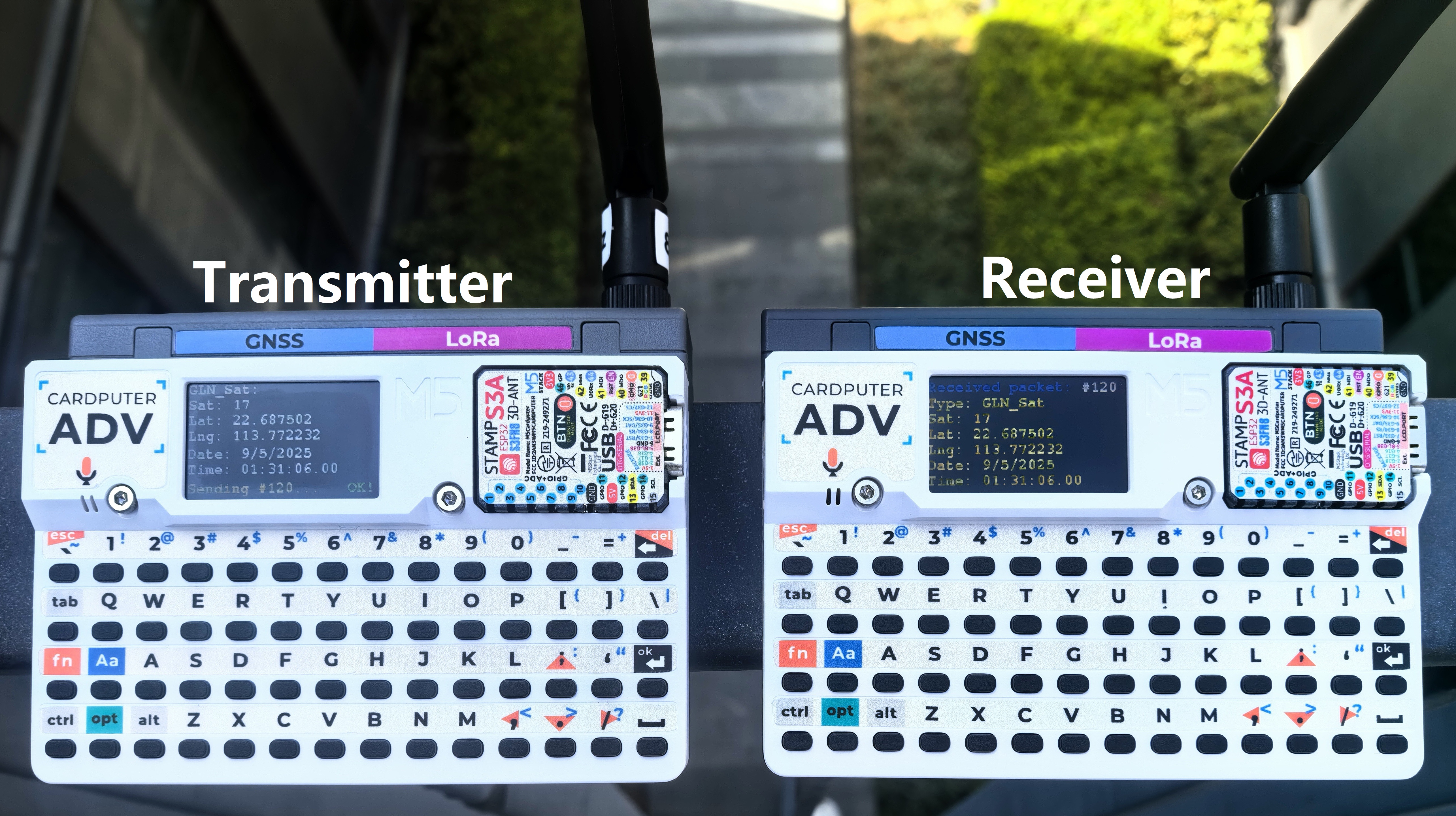
- 发送端串口返回信息:
=========================================
Location: satellites:17
GNSS Mode:GLN_Sat
22.687502,113.772232
Date/Time: 9/5/2025 01:31:06.00
[LoRa] Sending GPS data:
Type:GLN_Sat Count:120 Sat:17 Lat:22.687502 Lng:113.772232 Date:9/5/2025 Time:01:31:06.00
Transmission finished!
- 接收端串口返回信息:
[LoRa] Received packet:
[LoRa] Data: Type:GLN_Sat Count:120 Sat:17 Lat:22.687502 Lng:113.772232 Date:9/5/2025 Time:01:31:06.00
[LoRa] RSSI: -2.00 dBm
[LoRa] SNR: 6.50 dB
[LoRa] Frequency error: -789.77 Hz